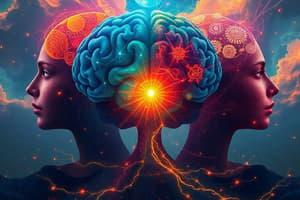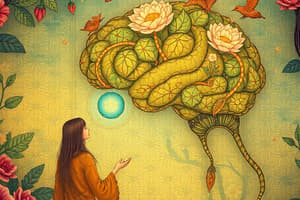Podcast
Questions and Answers
What is the main focus of psychometric theories of intelligence?
What is the main focus of psychometric theories of intelligence?
- Characterizing the system of structures and mechanisms of mind
- Measuring and quantifying intelligence through standardized tests (correct)
- Synthesizing various systems theories of intelligence
- Exploring multiple forms of intelligence
Which theory proposes that there are multiple forms of intelligence such as linguistic, logical-mathematical, and musical intelligence?
Which theory proposes that there are multiple forms of intelligence such as linguistic, logical-mathematical, and musical intelligence?
- Systems theories
- Sternberg's triarchic theory
- Gardner's theory of multiple intelligences (correct)
- CHC theory
According to systems theories of intelligence, what do they attempt to characterize?
According to systems theories of intelligence, what do they attempt to characterize?
- Measuring and quantifying intelligence through standardized tests
- The system of structures and mechanisms of mind that comprise intelligence (correct)
- The synthesis of earlier psychometric theories of intelligence
- The general ability that can be measured by analyzing performance on tasks
Which theory is a synthesis of earlier psychometric theories of intelligence?
Which theory is a synthesis of earlier psychometric theories of intelligence?
What is the primary focus of Gardner's theory of multiple intelligences?
What is the primary focus of Gardner's theory of multiple intelligences?
In the context of intelligence theories, what is the central idea behind psychometric theories?
In the context of intelligence theories, what is the central idea behind psychometric theories?
Which theory proposes that intelligence has three aspects: analytical, creative, and practical?
Which theory proposes that intelligence has three aspects: analytical, creative, and practical?
What is the most widely accepted theory that suggests three strata of intelligence, including general ability and fluid and crystallized ability?
What is the most widely accepted theory that suggests three strata of intelligence, including general ability and fluid and crystallized ability?
According to Gardner's Theory of Multiple Intelligences, what type of intelligence involves an individual's understanding of themselves?
According to Gardner's Theory of Multiple Intelligences, what type of intelligence involves an individual's understanding of themselves?
Which theory defines intelligence as 'mental activity directed toward selection, and shaping of real-world environments relevant to one's life'?
Which theory defines intelligence as 'mental activity directed toward selection, and shaping of real-world environments relevant to one's life'?
Which theory argues that intelligence is not a single ability but encompasses multiple intelligences such as linguistic and musical intelligence?
Which theory argues that intelligence is not a single ability but encompasses multiple intelligences such as linguistic and musical intelligence?
'g-f' and 'g-c' are associated with which stratum in the CHC theory of intelligence?
'g-f' and 'g-c' are associated with which stratum in the CHC theory of intelligence?
Study Notes
Theories of Intelligence
Theories of Intelligence
The field of psychology has long been fascinated by the concept of intelligence, and over the years, various theories have emerged to explain what intelligence is and how it can be measured. In this article, we will explore some of the most prominent theories of intelligence, including psychometric theories, systems theories, and biologically based theories.
Psychometric Theories
Psychometric theories of intelligence are based on the idea that intelligence can be measured and quantified through psychometric tests, such as intelligence quotient (IQ) tests. These theories propose that intelligence is a general ability that can be measured by analyzing an individual's performance on a standardized set of tasks. The most widely accepted psychometric theory is the CHC theory, which is a synthesis of earlier psychometric theories of intelligence.
Systems Theories
Systems theories of intelligence attempt to characterize the system of structures and mechanisms of mind that comprise intelligence. Two notable systems theories are Gardner's theory of multiple intelligences and Sternberg's triarchic theory of intelligence. Gardner's theory posits that there are multiple forms of intelligence, including linguistic, logical-mathematical, spatial, musical, bodily-kinesthetic, interpersonal, intrapersonal, and naturalist intelligence. Sternberg's triarchic theory, on the other hand, integrates components that were lacking in Gardner's theory and proposes that intelligence has three aspects: analytical, creative, and practical.
Biologically Based Theories
Biologically based theories of intelligence aim to account for intelligence in terms of brain-based mechanisms. Different biological accounts are given their own section, immediately following this one.
CHC Theory
The CHC theory, or Cattell, Horn, Carroll theory, is a widely accepted theory that suggests there are three strata of intelligence that are hierarchically related to each other. Stratum I includes narrow abilities, Stratum II, broad abilities, and Stratum III, general ability. The most important abilities for the purposes of this article are general ability (Stratum III), also referred to as g, and fluid and crystallized ability (Stratum II), also referred to as g-f and g-c. General ability is an overarching ability that is theorized to be relevant to, and involved in, a very wide variety of cognitive tasks. It has been found to be correlated with performance on a very wide range of cognitive functions and life outcomes, such as income, job performance, and even health.
Gardner's Theory of Multiple Intelligences
Gardner has argued that intelligence is not a single ability but rather multiple intelligences. These multiple intelligences include linguistic, musical, logical-mathematical, spatial, bodily-kinesthetic, interpersonal, intrapersonal, and naturalist intelligence. Gardner's theory is based on a variety of sources of evidence, including neuropsychological and psychometric evidence.
Sternberg's Triarchic Theory of Intelligence
Sternberg defined intelligence as "mental activity directed toward selection, and shaping of real-world environments relevant to one's life". His triarchic theory of intelligence is based on the definition of intelligence as the ability to achieve success based on your personal standards and consists of three aspects: analytical, creative, and practical intelligence.
Key Takeaways
In summary, theories of intelligence range from having one general intelligence (g) to certain primary mental abilities and multiple intelligences. The most widely accepted theory is the CHC theory, which is a synthesis of earlier psychometric theories of intelligence. Gardner's theory of multiple intelligences and Sternberg's triarchic theory of intelligence are examples of systems theories of intelligence, while biologically based theories attempt to account for intelligence in terms of brain-based mechanisms.
Studying That Suits You
Use AI to generate personalized quizzes and flashcards to suit your learning preferences.
Description
Explore the prominent theories of intelligence in psychology, including psychometric theories (e.g. CHC theory), systems theories (e.g. Gardner's theory of multiple intelligences, Sternberg's triarchic theory), and biologically based theories. Understand how intelligence is conceptualized, measured, and explained through various theoretical frameworks.




